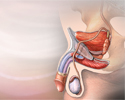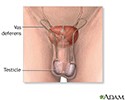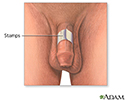Erection problems
Erectile dysfunction; Impotence; Sexual dysfunction - male
An erection problem occurs when a man can't get or keep an erection that is firm enough for intercourse. You may not be able to get an erection at all. Or, you may lose the erection during intercourse before you are ready. Erection problems usually don't affect your sex drive.
Erection problems are common. Almost all adult men have trouble getting or keeping an erection at one time or another. Often the problem goes away with little or no treatment. But for some men, it can be an ongoing problem. This is called erectile dysfunction (ED).
If you have trouble getting or keeping an erection more than 25% of the time, you should see your doctor.
Causes
To get an erection, your brain, nerves, hormones, and blood vessels all need to work together. If something gets in the way of these normal functions, it can lead to erection problems.
An erection problem is usually not "all in your head." In fact, most erection problems have a physical cause, such as:
- Disease:
- Diabetes
- High blood pressure
- Heart or thyroid conditions
- Clogged arteries (atherosclerosis)
- Depression
- Nervous system disorders, such as multiple sclerosis or Parkinson's disease
- Medicines
- Antidepressants
- Blood pressure medications (especially beta-blockers)
- Heart medications (such as digoxin)
- Sleeping pills
- Some peptic ulcer medications
- Other physical causes
- Low testosterone levels. This can make it difficult to get an erection. It can also reduce a man's sex drive.
- Nerve damage from prostate surgery.
- Nicotine, alcohol, or cocaine use.
- Spinal cord injury.
In some cases, your emotions or relationship problems can lead to ED, such as:
- Poor communication with your partner.
- Feelings of doubt and failure.
- Stress, fear, anxiety, or anger.
- Expecting too much from sex. This can make sex a task instead of a pleasure.
Erection problems can affect men at any age. But they are more common as you get older. Physical causes are more common in older men. Emotional causes are more common in younger men.
If you have erections in the morning or at night while you sleep, it's likely not a physical cause. Most men have 3 to 5 erections at night that last about 30 minutes. Talk with your doctor about how to find out if you have normal nighttime erections.
Causes
An erection involves your brain, nerves, hormones, and blood vessels. Anything that interferes with these normal functions can lead to problems getting an erection.
Common causes of erection problems include:
- Diseases such as diabetes, high blood pressure, heart or thyroid conditions, poor blood flow, depression, or nervous system disorders (such as multiple sclerosis or Parkinson's disease)
- Medicines, including blood pressure medications (especially beta-blockers), heart medications (such as digoxin), some peptic ulcer medications, sleeping pills, and antidepressants
- Nerve damage from prostate surgery
- Nicotine, alcohol, or cocaine use
- Poor communication with your partner
- Repeated feelings of doubt and failure
- Spinal cord injury
- Stress, fear, anxiety, or anger
- Unrealistic sexual expectations, which make sex a task instead of a pleasure
Erection problems become more common with age. However, they can affect men at any age. Physical causes are more common in older men. Emotional causes are more common in younger men.
Low levels of testosterone can lead to erection problems. They may also reduce a man's sex drive.
Home Care
For many men, lifestyle changes can help:
- Cut down on smoking, alcohol, and illegal drug use.
- Get plenty of rest and take time to relax.
- Exercise and eat a healthy diet to keep good blood circulation.
- Use safe sex practices to prevent HIV and STDs.
- Talk openly to your partner about sex and your relationship. If you cannot do this, counseling can help.
Couples who cannot talk to each other are likely to have problems with sexual intimacy. Men who have trouble talking about their feelings may find it hard to share their anxiety about sexual performance. Counseling can help both you and your partner.
When to Contact a Medical Professional
Call your doctor if:
- The problem does not go away with lifestyle changes
- The problem begins after an injury or prostate surgery
- You have other symptoms, such as low back pain, abdominal pain, or a change in urination
If erection problems seem to be caused by a medication you are taking, talk to your health care provider. You may need to lower the dose or change to another drug. Do NOT change or stop taking any medications without first talking to your health care provider.
Talk to your health care provider if your erection problems have to do with a fear of heart problems. Sexual intercourse is usually safe for men with heart problems.
Call your doctor right away or go to an emergency room if the medication you are taking for erection problems gives you an erection that lasts for more than 4 hours.
What to Expect at Your Office Visit
Your doctor will perform a physical exam, which may include:
- Checking your blood flow (circulation)
- An exam of your penis and rectum
- An exam of your nervous system
To help find the cause of the problem, your doctor will ask medical history questions such as:
- Have you been able to get and keep erections in the past?
- Are you having trouble getting an erection, or keeping erections?
- Do you have erections during sleep?
- How long have you had trouble with erections?
- What medications are you taking (including prescription medications, over-the-counter medications, and recreational drugs)?
- Do you smoke? How much each day?
- Do you use alcohol? How much?
- Have you recently had surgery?
- Have you ever had surgery or other treatments for your blood vessels?
- Are you depressed?
- Are you afraid or worried about something?
- Are you experiencing a lot of stress?
- Has your energy level decreased?
- Are you sleeping well each night?
- Are you afraid of sexual activity because of physical problems?
- Have there been any recent changes in your life?
- What other symptoms do you have?
- Have you noticed changes in feeling to your penis?
- Do you have any problems with urination?
Tests that may be done include:
- Blood tests, including:
- Complete blood count
- Hormone profile
- Metabolic panel
- PSA
- Nerve testing
- Nocturnal penile tumescence (NPT) to check for normal nighttime erections
- Penile ultrasound to check for blood vessel or blood flow problems
- Psychometric testing
- Rigidity monitoring
- Urine analysis
TREATMENT
The treatment may depend on the cause of the problem. Talk to your health care provider about the best way to treat your erection problem.
There are many treatment options today, including:
- Injections into the penis
- Medicines inserted into the urethra
- Medicines taken by mouth
- Surgery
- Vacuum devices
Ask your health care provider about the possible side effects and complications of each treatment.
Sildenafil (Viagra), vardenafil (Levitra), and tadalafil (Cialis) are medicines called phosphodiesterase-5 (PDE5) inhibitors. They work only when you are sexually aroused. They usually start to work in 15 to 45 minutes.
These drugs can have side effects, which can range from muscle pain and flushing to heart attack. Do not use these drugs with medications such as nitroglycerin. The combination can cause your blood pressure to drop. Some men have died after taking these drugs with nitroglycerin.Use PDE5 inhibitors with caution if you have any of the following conditions:
- Recent stroke or heart attack
- Severe heart disease, such as unstable angina or irregular heartbeat (arrhythmia)
- Severe heart failure
- Uncontrolled high blood pressure
- Uncontrolled diabetes
- Very low blood pressure
If pills do not work, other treatment options include:
- Testosterone replacement using skin patches, gel, or injections into the muscle -- if your testosterone level is low.
- A medicine called alprostadil, injected into the penis or inserted into the urethra, improves blood flow to the penis. This usually works better than medications taken by mouth.
- A vacuum device can be used to pull blood into the penis. A special rubber band is then used to keep the erection during intercourse.
- Some men may need a penis implant (prosthesis).
Many herbs and dietary supplements are marketed to help sexual performance or desire. However, none of these supplements have been proven effective for treating erectile dysfunction, and they may not always be safe.
Review Date: 9/19/2011













